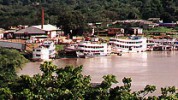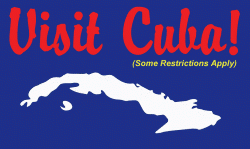|

The world is losing indigenous cultures even more rapidly than it is
losing indigenous people! Take a stand with Cultural Survival, which
promotes sustainable trade with indigenous communties, preservation of
their languages, and protection of their human rights. The web site
describes current and past projects and provides a lot of ways to get
involved, including volunteer experiences abroad.
|
Student
Opportunities
I have been with Bridgewater students in Cuba, Nicaragua, Brazil, Cape
Verde, and even Vermont! Every time I have taken such a trip, students
with little previous experience catch the "travel bug" and are eager to
see more of the world. The links in this section can get you started on
finding a program and even finding
money to help pay for it. |
|
|
Study
geography in Brazil: We'll pay for it!
I am a
co-director of the U.S.-Brazil Consortium in Urban Development, begun
in 2006 with
generous funding from the U.S. Department of Education's Fund for the
Improvement of Post-Secondary Education (FIPSE) and its Brazilian
counterpart,
CAPES. The grant provides funding for several years of semester-long
exchanges to study the role of geography in urban planning in southern
Brazil and New England.
Students pay tuition and
earn credit at Bridgewater while studying abroad. The program pays for
language classes, travel, and most living expenses!
|
Latin America
Resources
|
I created this page to help
students of geography find reliable and critical resources about Latin
America. It is not comprehensive -- the region is too vast and complex
-- but it includes many of my favorite sites for learning about what is
happening in the Americas.
|
|
|
The
Office of International Programs coordinates all
study-abroad opportunities for Bridgewater State College students,
including semester-long exchanges and short-term study tours led by BSC
faculty. The office is also involved with the other international
initiatives of the college.
|
|
|
The
North American Forum on Integration studies the three
countries of the NAFTA region -- Canada, Mexico, and the United States
-- in terms of their important, tri-lateral relations. Students from
all disciplines are welcome to participate in FINA's annual
Trimuvirate, a week-long model parliament held in late May. Bridgewater
State College will be sending
a delegation in May 2007. Contact me immediately if you would like to
be
part of it; financial assistance will be available to cover
most costs. Preference is given to students who speak two of the NAFTA
languages: English, French, and Spanish.
|
|
|
The Latin American and
Caribbean Studies at
Bridgewater
State College offers an interdisciplinary minor (18 credit hours) and a
variety of campus programs related to Latin America. Coordinating the
program
has helped me to make a lot of interesting connections, both on campus
and throughout the hemisphere.
|
Places I Have
Visited
I have never been to a place I found boring. Everywhere I have ever
been, I have found something interesting. Usually I notice something
unusual about the topography, the soil, the waterways, or the
vegetation. It could, for example, be something as simple as noticing
that the slopes on the south side of a highway are wetter or more
likely to be covered with ice than the slopes on the north side. Beyond
the physical geography, though, the human character (and characters!)
of a place make it memorable. This section provides many stories, maps,
and photos of places I have had the privilege to visit.
For everything in this section, I owe a great debt of gratitude to the
thousands of people who have made my travels possible and enjoyable.
These include friends and professional colleagues, travel agents and
airline pilots, hotel clerks and waitresses, and passersby on countless
street corners.
|
|
This
project shows maps of every county I have
visited in 46 of the 50 United States, with aerial photographs of most
of my homes. It also points to basic information about each state and
travel advice for a few locations.
The project now
includes maps of my international travels at the state and provincial
scale.
|
|
|
 I first
visited Rondonia, in the western part of the Brazilian Amazon, in 1996.
This page includes many resources about urbanization and deforestation
in this modern frontier, as well as the other parts of Brazil I have
visited.
I first
visited Rondonia, in the western part of the Brazilian Amazon, in 1996.
This page includes many resources about urbanization and deforestation
in this modern frontier, as well as the other parts of Brazil I have
visited.
|
|
|
Perhaps
it is something about far-away places abbreviated
"RO:" in 2004 I organized a delegation from Bridgewater to visit our
partner church in
Romania, the Unitarian congregation in Haranglab, Transylvania.
|
|
In
March 2006, I had the great privilege of leading a study
tour of Cape Verde, a country on a small group of islands near the
coast of West Africa. A group of 20 students, alumni, faculty and staff
explored ways for low-income countries to pursue development that is
socially and environmentally sustainable.
I will be leading
another
group in 2008!
|
|
|
 During
early January 2003, I
went to Cuba as part of a BSC study tour. This was an extraordinary
opportunity, since Cuba is the only country in the world to which the
United States government prohibits travel for most U.S. citizens. During
early January 2003, I
went to Cuba as part of a BSC study tour. This was an extraordinary
opportunity, since Cuba is the only country in the world to which the
United States government prohibits travel for most U.S. citizens. |
|
|
 My Geography of Coffee page brings together two of my
passions:
learning about the world and enjoying a hot, bitter cup of coffee. It
provides information about the Geography of Coffee course that I taught
in Nicaragua in January 2006 and am repeating in January 2007. It also
includes recipes, stories, and music about the magical brew. See some
of our great photos
and stories ! My Geography of Coffee page brings together two of my
passions:
learning about the world and enjoying a hot, bitter cup of coffee. It
provides information about the Geography of Coffee course that I taught
in Nicaragua in January 2006 and am repeating in January 2007. It also
includes recipes, stories, and music about the magical brew. See some
of our great photos
and stories !
|
Global Topics
This section is organized by topic -- some happy, some tragic -- rather
than place.
|
| Pax
Mundo |
I created this entirely
separate web site to address the question: Is war the only way that
Americans can learn geography? |
| Hurricane
Reflections |
The major hurricanes of 2005 --
Katrina and Rita -- exposed many shameful inequities and
misplaced priorities. In many ways, it was not a time to be proud
of America. I was, however, enormously proud of three colleagues from
the counseling program at Bridgewater State College. Dr. Michael Kocet,
Dr. Maxine Rowlins, and Dr. Louise Graham went to the Gulf Coast to
provide counseling services for relief workers, who were so emotionally
drained by the experience. On these pages, the three professors tell
stories and ask important questions.
|
|
|
 This page presents my thoughts
about the war in Iraq, discussion of why the rest of the
world opposed it, and links to alternative news sources. My perspective
on support for the troops is also presented, as are some thoughts on
the
capture of Saddam Hussein. This page presents my thoughts
about the war in Iraq, discussion of why the rest of the
world opposed it, and links to alternative news sources. My perspective
on support for the troops is also presented, as are some thoughts on
the
capture of Saddam Hussein.
It is time to get serious about SUPPORTING THE TROOPS .
|
|
|
 A student
who was in my class at the time of the September 11 attacks lost a
cousin
in one of the airplanes. She did not finish that semester; even
students
not so directly affected had trouble with their studies. My father
spent
part of his birthday on a rooftop in Washington, watching the smoke
rise
from the Pentagon. A student
who was in my class at the time of the September 11 attacks lost a
cousin
in one of the airplanes. She did not finish that semester; even
students
not so directly affected had trouble with their studies. My father
spent
part of his birthday on a rooftop in Washington, watching the smoke
rise
from the Pentagon.
We were all touched by the attack on the land and ideals we love. We
also are now touched by what our leaders ask us to do in response. Some
of it is perhaps sensible, but some of it clearly is not. This page
provides access both to tributes and to a range of opinions about the
aftermath
of the attacks.
|
Musica
|
I
am increasingly interested in using music to learn more
about the human geography of Latin America, and I enjoy sharing the
rich variety of music with my students and other audiences. Complex and
dynamic global connections are reflected in music that ranges from
deeply rooted regional styles to highly eclectic synergies of samba,
mariachi, rock, urban, and much more. On this page, I share specific
examples from my presentations, and links for learning more and perhaps
building your own Latin American CD collection.
|
| Tsunami
Visualizations |
This
educational site is a compilation of high-quality images and
digital models of the Boxing Day 2004
tsunami in Southeast Asia. The tsunami is out of
the news in the United States, but the recovery will be important in
this region for years
to
come. The collection is compiled by John McDaris at Carleton College.
My colleague, Dr. Wing-kai To, has created a comprehensive site on the
disaster and relief efforts . For an important critical view, see
Derrick Jackson's " Victims that we don't count " essay. |
|
|
My
presentations and additional links regarding the dire circumstances of
external debt in many developing countries. Dozens of the poorest
countries in the world are saddled with enormous debts, even though
they gained nothing from the loans on which the debts are based.
|